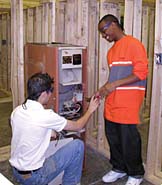
Attitude — Here is the secret to maintaining a good and healthy attitude: Help others. Put thought into helping customers, co-workers, and your boss. Helping others makes you feel good. When you feel good, it shows.
Reliability — Be on time. When you arrive on time, it shows that you and your company care. It also shows that you value and respect your customer’s time.
Dependability — Showing up for work every day demonstrates dependability. When you do not make it to work, you cost the company money. Sometimes the company even loses a customer. The cost of rearranging a schedule and inconveniencing customers is staggering. Being dependable also means handling the customer calls that you are capable of handling. A clean and check technician who frequently forgets to turn power back on to the equipment before leaving is not dependable.
Image — Customers want to do business with people who are smartly dressed, well groomed, and clean. A disheveled appearance makes you look bad. But more importantly it makes your company look bad. A company that looks bad does not gain repeat business. Remember: repeat business is a good thing. It gives you more opportunity to create value.
Flexibility — Be flexible with your time and your mind. Furnaces do not always break down when it’s convenient for us. Realize there will be times when you will have to work late or on weekends. Keep an open mind to situations that you encounter in the field. Be sure you are repairing the problem and not just the symptom.
Communications — Communication is the exchange of thoughts, messages, and information. Communicate clearly in written or verbal form. Will the office staff be able to read your invoices? Will customers be able to understand your technical jargon? Put yourself in the other person’s position. Speak and write in simple terms they will understand.
Driving skills — Obey the traffic laws and drive defensively. If another motorist angers you, let it go. Channel your energy in a constructive manner.
Truck maintenance — Keep a schedule for required truck maintenance. Do this even if the office staff keeps a schedule, too. Service calls are often rearranged and your oil change might be forgotten. Kindly remind the dispatcher. You are a member of a team; it’s all about helping each other out. Don’t forget to immediately report any abnormalities with your truck. Wash your truck once per week.
Mechanical skills — Even Michael Jordan had to practice. If you need to improve your mechanical skills, practice them at home. Get an old piece of equipment, tear it apart, and put it back together. Learn how the components work together as a system. Practice brazing and soldering at home, too.
Systems — Create systems for yourself and follow them methodically. From procedures on troubleshooting calls to truck and jobsite organization to re-stocking your truck, create systems.
Tools — Invest in every tool and meter made in the HVAC universe. Be kind and take good care of your tools. A rank amateur shows up on a job with tools that do not work and meters with dead batteries. You are a professional; act accordingly.
Industry awareness — Keep an eye on what is going on in the HVAC world. Be aware of new tools, techniques, and trends. Frequent industry-related Internet sites and join trade associations.
Collect knowledge — Keep notes on situations that you encounter during the day. If a senior tech gives you advice, write it down. Bookmark useful Internet sites and save trade journal articles.
Learn — Ask questions. Veteran technicians respect those who ask questions. Every service call provides a learning experience on everything from technical matters to customer service.
Coaching — Offer to help others. Your value increases as you increase other’s value.
Customer needs — Besides fixing a broken-down unit, ask customers if they are comfortable in their homes and businesses. People may not be aware of solutions to dryness, excess moisture, and temperature swings.
Your health — Feed and care for your mind, body, and spirit. You are of no value to anyone if you are broken down.
You have chosen to be an HVAC professional. Why not give yourself a fighting chance to be the best you can be? Create value.
Rothacker is a member of the National Comfort Institute’s Advisory Board and a National Comfort Team Founding Member. For questions or comments on the Tech Page, contact Rothacker at ewizaard@hotmail.com.
Publication date: 07/21/2003

Report Abusive Comment